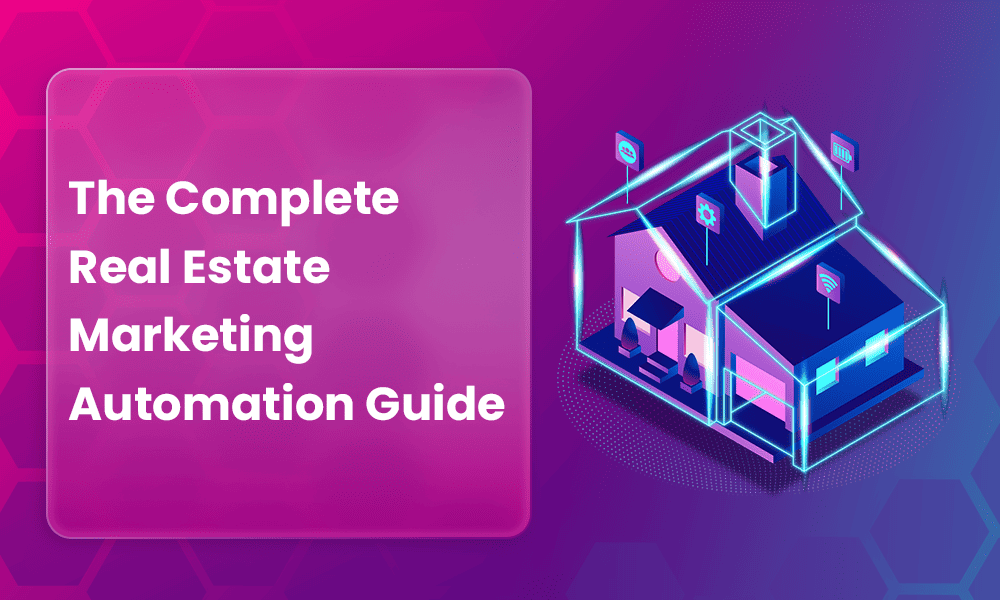There’s a lot on any real estate agent’s plate. Whether it’s having a central listing database, keeping track of client requirements, or attracting the right high-profile clients — realtors have to master all this and more!
What if you could reduce manual labor and improve the accuracy of all these processes? That’s where marketing automation becomes important.
Especially as your firm scales up, you’re going to struggle without a marketing automation toolkit for your real estate agency.
We’ve curated a handy guide for real estate agents and investors. By the end of this guide, you’ll be able to:
- Understand what real estate marketing automation is and what it can do for your business
- Overcome the most pressing challenges that realtors face
- Follow five simple steps to set up your real estate email marketing automation
- Study the most important real estate marketing automation use cases
- Pick the best-suited marketing automation tool for your firm
- Brainstorm some marketing automation ideas for your firm
Let’s get right to it!
Table of Contents
What is Real Estate Marketing Automation?
Real estate marketing automation can be defined as taking advantage of software tools to automate certain repetitive, everyday tasks. You can create automations for different tasks like assigning scores to new leads, sending out automated SMS or emails about open houses, publishing and sending a real estate newsletter, and greeting clients on their birthdays or other special occasions.
We’ll go more into use cases in the next section.
But first, let’s look at the main marketing challenges for real estate agents and how marketing automation could make your life easier.
👉 Enhance your automation strategy with our free, customizable email templates that showcase your strengths.
Major Marketing Challenges for Real Estate Marketing Campaigns
What separates a good realtor from a great realtor is marketing. Here are the key challenges real estate agents face when it comes to marketing campaigns, and how you can overcome them.
1. Keeping up with technological advancements
We all know that technology has grown much faster than the average Joe’s ability to keep up with the changes. And, realtors are no exception. In fact, 45% of real estate brokers said that keeping up with technology was their biggest challenge!
Modern problems require modern solutions, and leveraging new technology gets you quicker and more efficient solutions. Choosing the right marketing software and tools can turbo-charge your business.
To avoid falling into this trap, ensure that you’re using all marketing channels. This includes email, website listings, social media channels, SMS marketing, voice messages, and push notifications.
Read also: What is a CRM in Real Estate? Cheat Sheet for Realtors
2. Inability to attract and retain high-end clients and listings
Not all clients were created equal. Some of your prospects and leads may have a higher chance of actually purchasing or selling a listing with your company. Of course, it’s nothing personal.
But, every realtor knows that their success comes from attracting and retaining the right clients and leads. Marketing automation can automate your lead-scoring process in a fraction of the time it would take any human to crunch those numbers. You can also segment leads automatically based on factors like age, gender, location, income, and more!
A simple sign-up form can attract new leads. And, once you have leads, it’s important to nurture them or ‘warm’ them up. Marketing automation can help you nurture leads as well!
Enhance Your Email Marketing
Want to make your emails more impactful? Check out our beautiful, easy-to-customize recruitment and real estate email templates. Designed to boost engagement, these templates from EngageBay will help your emails stand out. Just customize the images, headings, and CTAs for your brand, and hit send in a few minutes!
3. Time-consuming marketing processes
The marketing strategy for a real estate company would be much different from another industry like eCommerce.
Prospects would take just minutes to decide to buy sunglasses or a pair of shoes, especially if their credit card is nearby. But, a whole lot of thought goes into purchasing a dream home!
And, as your firm grows, you’d have to manage several listings and clients in just one week. This can be a lot for any realtor to track on their own. That’s where marketing automation can save you precious time. After all, your marketing automations don’t need weekends or time off, unlike us humans!
Read also: 12 Best Real Estate CRMs for Investors and Agents in 2023 (Free & Paid)
4. Increasing competition
There are around 3 million licensed realtors in the USA today! And, studies have shown that over 91% of real estate firms in America use a customer relationship management (CRM) tool to streamline their marketing automation workflows.
So, it’s safe to assume that most of your competitors already use marketing automation tools. Why get left behind, especially in today’s market?
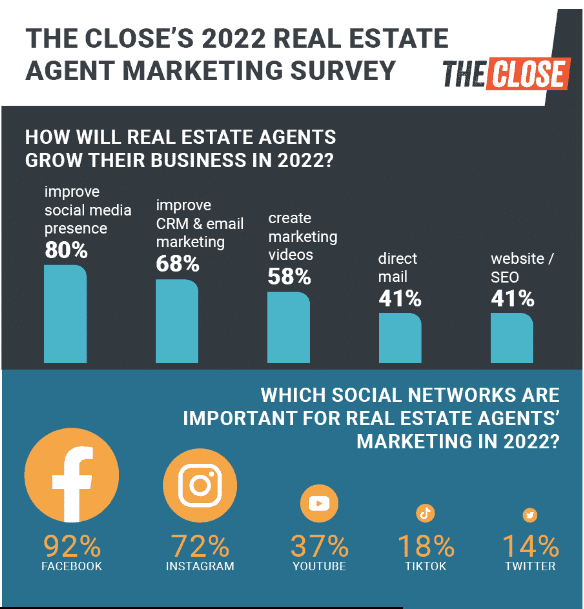
Key Benefits of Implementing Real Estate Marketing Automation
There are several benefits to implementing real estate marketing automation for your firm. Here are some of the major advantages.
- Marketing automation speeds up your marketing process with a higher level of accuracy. Realtors typically see a growth of 41% with the implementation of a marketing automation tool for real estate!
- It makes it easier for real estate companies as they’re scaling up in size. As you look to generate more leads, marketing automation will become your best friend. Also, according to surveys, only 1% of homebuyers found their home through print or TV advertisements in 2022. So, don’t miss out on prospects who are online.
- It’s reliable and has a high ROI: Not only will you be able to add and nurture new leads automatically, but you’ll also be able to create targeted marketing strategies for each type of lead. And, realtors earning over $100,000 a year were twice as likely to implement a CRM solution for their business. The best players in the field are already taking advantage of marketing automation.
I’m sure you’re thinking now — that’s great, but what exactly can I do with marketing automation on a practical level?
Let’s brainstorm some creative and practical marketing ideas together.
👉Boost your online store’s revenue with these 7 must-try eCommerce marketing automation strategies and tools!
20 Real Estate Email Marketing Templates [Ready to Send]
Real Estate Marketing Automation Ideas
On a day-to-day level, here are some ideas to give you a clear picture of how marketing automation can work for you.
Capture new leads using a lead magnet
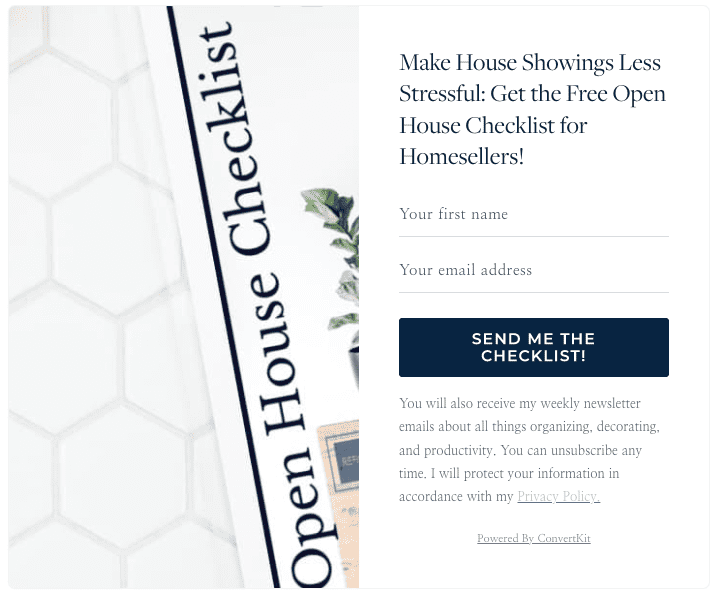
If you want to have your phone ringing with new prospects and leads, then a lead magnet is the way to go!
Let me break it down. A lead magnet is any kind of downloadable material that’s offered to your website visitors in exchange for their email ID. Your freebie could be anything from checklists for buyers/sellers, real estate webinars, or even eBooks.
Here’s how marketing automation can speed up this process. You’ll first need to create a landing page for new leads, where they can enter their details. Once you’ve created the freebie that adds value or answers pressing questions your prospects have, you can create a workflow on your CRM software to automatically create:
- A welcome email along with the downloadable
- A bunch of timed follow-up emails to begin nurturing the new lead
Once you have this workflow set up, any new lead who signs up on your landing page will automatically get the welcome email and the freebie. You can set up scheduled emails at specific intervals to begin warming the lead after that.

Set up autoresponders for quick, personalized communication
An autoresponder is simply a code or script that automatically sends out an email whenever a specified trigger is activated by a user’s interaction with your website or emails.
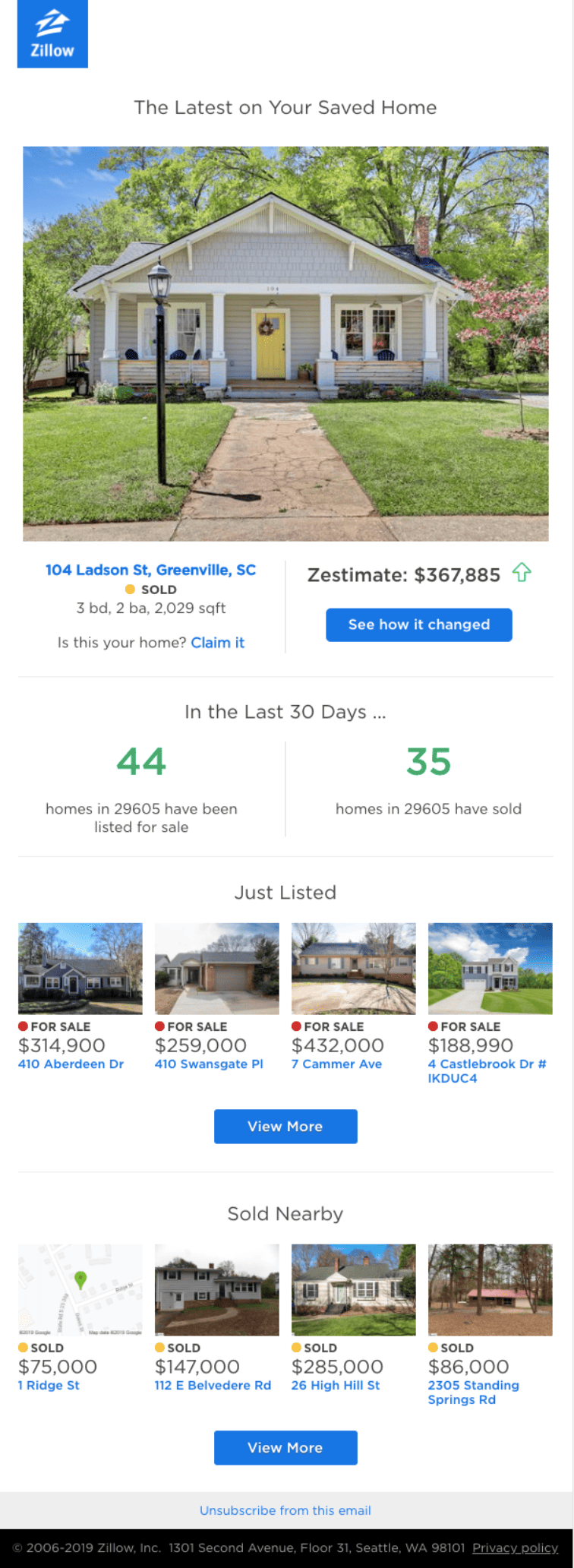
Let’s look at the example from Zillow above. Whenever a prospect saves a particular property they may be interested in, you schedule an autoresponder to reconnect with them about the saved property. You can use an autoresponder for these situations:
- Welcome emails whenever a new lead signs up
- Issuing customer support tickets when they face an issue
- Double opt-in subscriptions
- Reconnect with inactive leads to warm them up
- Wish clients on birthdays or anniversaries
- Reminders about open houses or viewings
- Ask for referrals and feedback/surveys
Read also: 9 Real Estate Landing Pages Sure to Inspire and Convert
Automate and optimize your team workflows
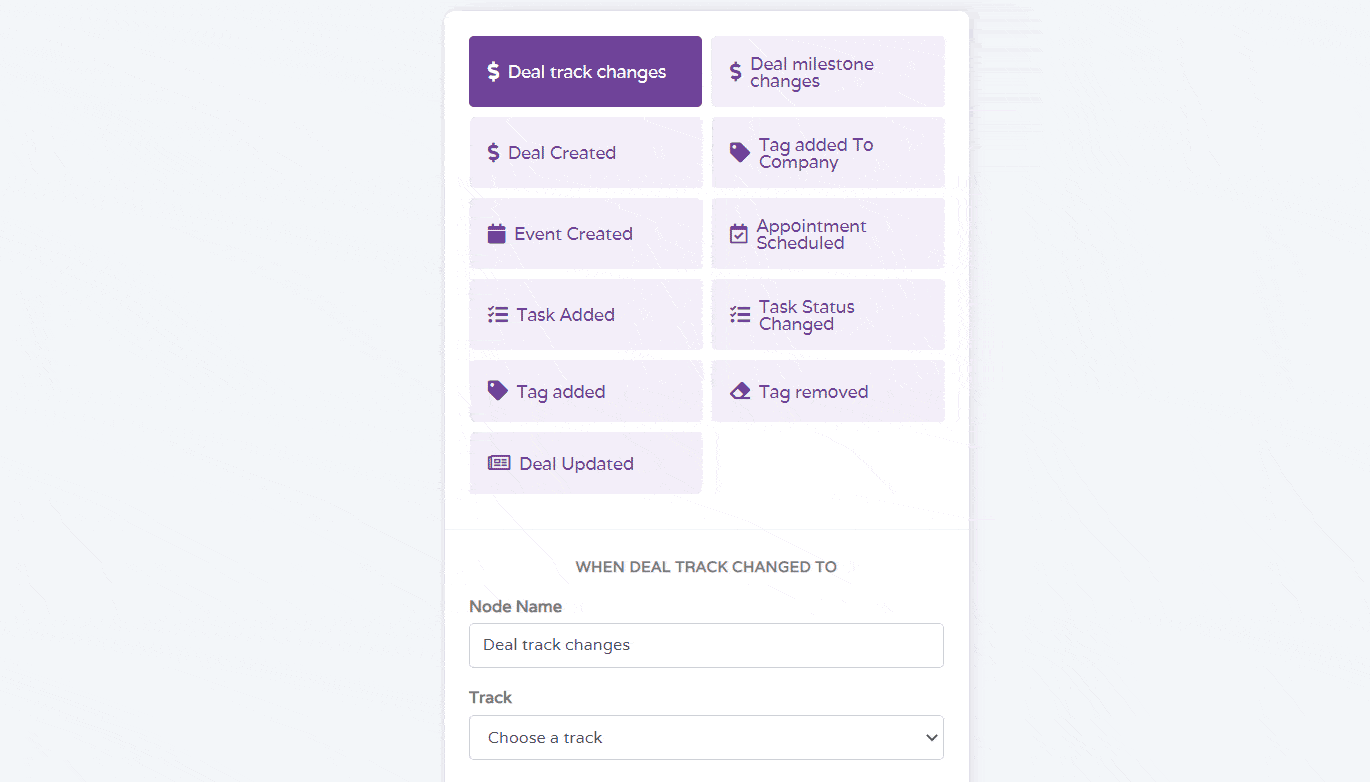
Here’s one step you can take today that’s sure to save you time and money — set up automated workflows for your internal teams.
A workflow is a digital sequence of steps and processes mapped out to reach specific business goals. With the help of marketing automation software, you can — without being an expert in coding — define preset tasks and actions to simplify the process from beginning to end.
For example, let’s say you have just wrapped an open house. You can set up workflows that clearly define the next step your listing agent has to take. This could include sending out automated follow-up emails, conducting surveys, talking to prospects who showed interest in the listing, trying to get a fair price for the seller, etc.
You can set up an automation for this workflow, which can be fully or partially automated. This reduces the amount of time and energy your employees/agents spend on repetitive tasks. Workflow automations are especially useful for capturing new leads, scoring them, and warming up ‘cooler’ leads.
👉Struggling with crafting the perfect real estate email? Our blog post offers 20 ready-to-send real estate email marketing templates to boost your marketing efforts. Send some emails now!🏅
Start SMS campaigns for exclusive viewings and open houses
Texting is a great way to follow up with existing clients, especially for time-sensitive reminders. With automation, you’ll be able to send out bulk texts at the click of a button to segments or all of your contact list at the same time. This is a great way to remind someone about an upcoming appointment or an upcoming open house.
Text messages typically have an open rate of 98%! This is much higher than email or telephone.
So, sending the right message to the right client at the right time is a piece of cake with SMS automation. You can also set up autoresponders to reply to text messages from your clients.
Read also: Real Estate CRM — Everything You Need to Know
6 Easy Steps to Set Up Your Real Estate Marketing Automation
It’s not all that complicated, especially with the latest developments in technology. It takes just about six simple steps to set up and get started with your real estate marketing automation. Let’s break it down.
1. Segment your leads
A lot of successful marketing automation relies on a segmented list of contacts and buyer personas. Remember, if you don’t know your target audience, any marketing campaign can fall flat on its face.
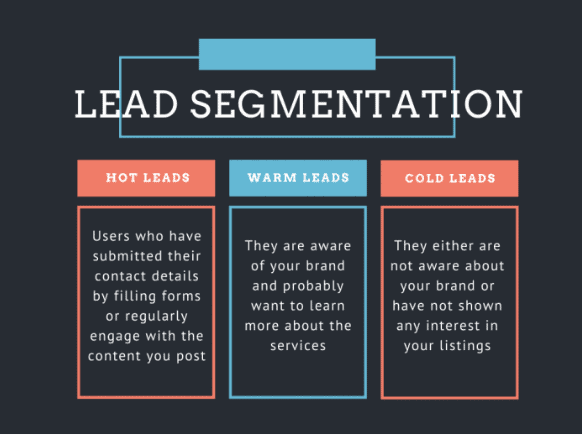
A buyer persona is a detailed profile of your target audience and their various characteristics. You can include the following aspects:
- Gender, age, and location
- Annual income
- Past buying/selling behavior
- Family size
- Their behavior on your website
- Where you got the lead (Zillow, realtor.com, etc.)
- Their requirements/preferences for properties
- Whether the lead is a buyer or a seller
The buyer personas depend entirely on the kind of listings and business deals you want to make. So, get as detailed about them as possible.
Read also: Cracking The Marketing Automation Process [A Guide For Beginners]
2. Get crystal clear on your marketing goals and strategies for each segment
Now, your marketing goals and strategies would be different for each segment of your contact list. For example, the needs/interests of a first-time homebuyer will be different from a buyer looking to invest in a commercial property.
Once you have your different buyer personas and customer segments, you must create a marketing strategy for each. Here’s what to focus on while devising marketing strategies for your business:
- Your USP: There are thousands of realtors that any prospect can choose them. So, your marketing goals should be defined by your Unique Selling Points (USPs). What makes your real estate firm, brokerage, or realtors stand out from the rest? All your marketing messages should take off from this basic premise.
- Marketing budget: Get clear on allocating your marketing budget for different purposes. This should be well-planned in advance before you start with your very first campaign.
- Measurable goals: The clearer your goals are, the more likely you’ll reach them. Instead of saying, “We want to grow our social media presence and generate new leads”, your goal should be more specific. Instead, you can set a goal: “Grow 500 followers across social channels, and generate 50 high-quality leads by the next quarter”. This way, you can re-evaluate when your strategies aren’t working.

3. Create a detailed buyer journey or customer journey map for each buyer persona
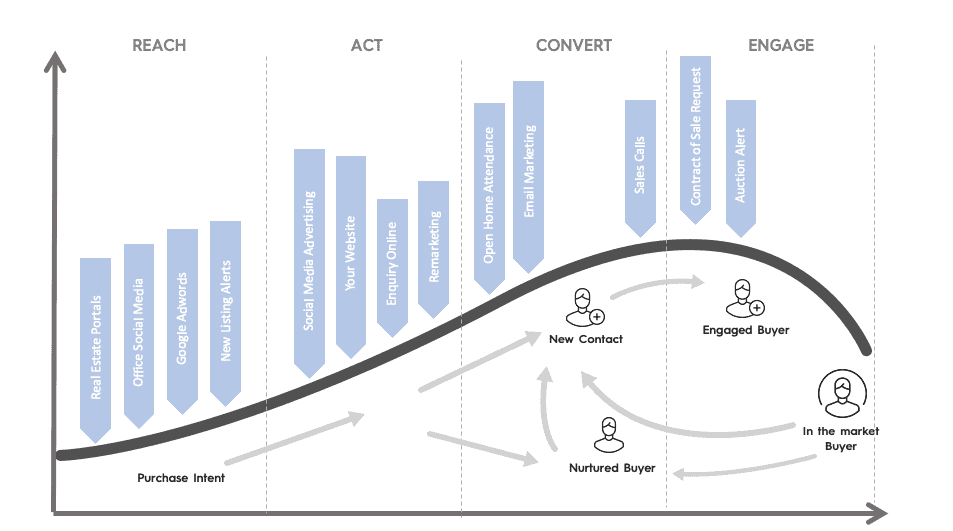
The next step is creating and mapping a customized buyer journey or customer journey for each buyer persona.
A customer journey map is a visual representation of the different steps that a buyer takes before closing a sale with your real estate firm or brokerage.
Once you’ve mapped out the various stages, you can implement the most effective marketing strategy for each stage of the customer journey.
For instance, a contact in the first stage of the journey will need to be warmed up and given info about why they should choose your firm over others. But, if a prospect has already shown interest and attended a few open houses, then they need to be driven to take action to close the deal.
So, the bottom line is to create a marketing strategy that caters to every single stage of the customer journey and drives prospects to the next stage of the journey.
Read also: Draft the Perfect Real Estate Drip Campaigns [Templates, Examples]
4. Identify opportunities that can be automated and create workflows for each stage of the buyer journey
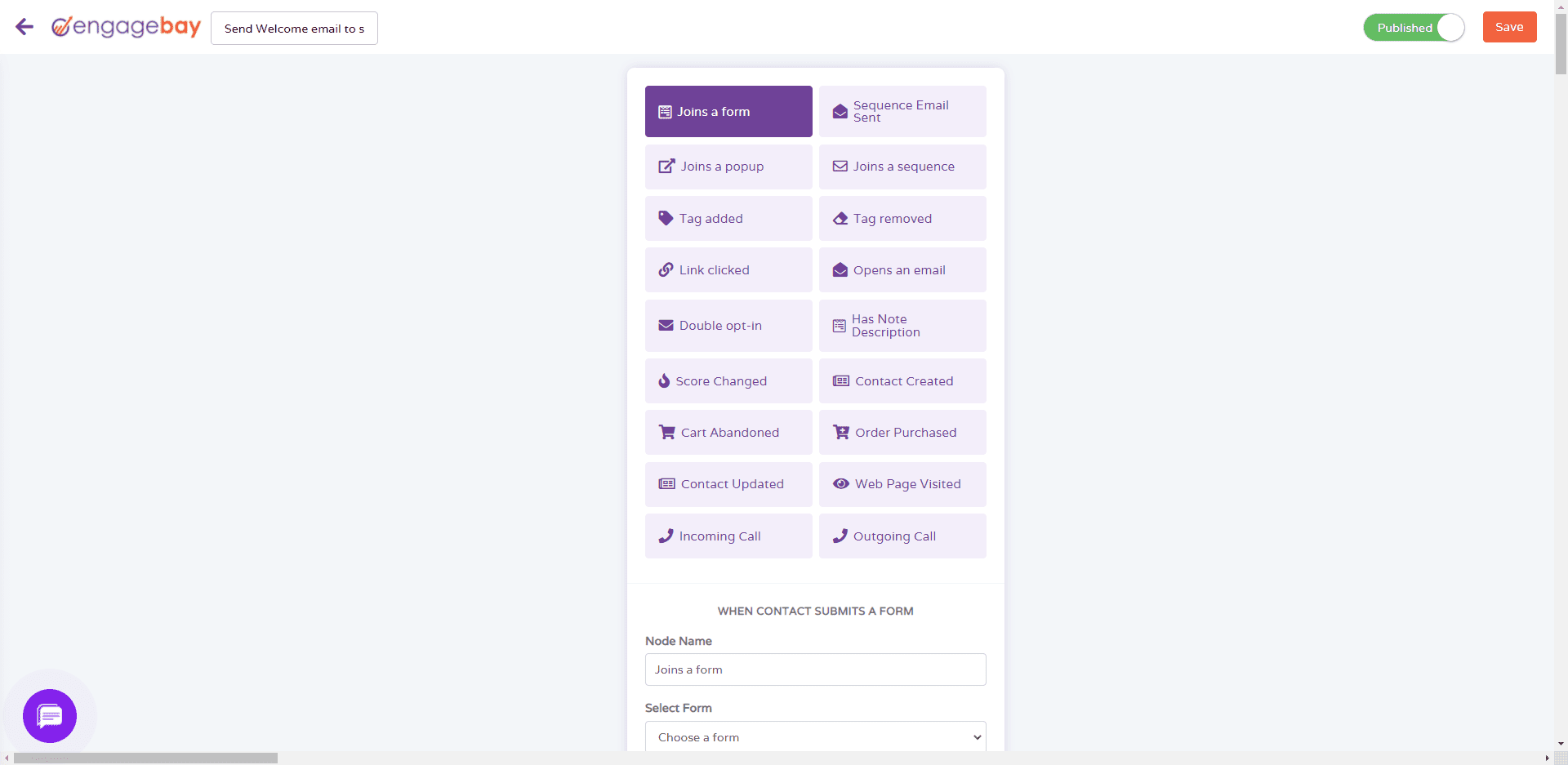
Typically, users report a 30-40% decline in costs after automating a job function. And, the best part is that it’s not too difficult to start.
You’ll need to sit with your team and brainstorm for automation opportunities in your real estate firm. Ask tough questions like
- What are some common repetitive tasks that agents undertake at each stage of the customer journey map?
- Which of these repetitive tasks are prone to manual errors and are time-consuming?
- Are these processes major contributors to revenue and sales?
- Which tasks create frustration for your agents or staff?
Once you’ve got your key automation opportunities, you need to crunch some numbers and look at how scalable it is in the long run. Then, on your CRM software, you can easily create workflows to automate each of the selected tasks.
👉 Optimize your marketing efforts with our email templates designed for efficiency and impact.
Read also: 23 Apartment Marketing Ideas For Today’s Real Estate Market
5. Conduct a content audit to identify what interests your prospects and run A/B Tests
A content audit is a process where you gather all your content (like blogs, emails, landing pages, and social media posts) in one place and analyze its strengths and weaknesses. Content audits will help you upgrade outdated content, and ensure that your content is in-line with your marketing goals.
According to surveys, 86% of companies run a content audit at least once a year! Here are some of the questions to keep in mind while auditing your content:
- What is your overall conversion rate and ROI for content created?
- Which pieces of content are outdated, and which ones can be used as it is?
- What are the target keywords for each piece of content?
- Which backlinks are working the best?
- Which writers have the best performance?
- What meta tags are working best?
- Which landing pages performed the best and why?
For each piece of content, analyze key metrics like the SERP, bounce rates, average session duration, number of backlinks, and number of social shares.
This will help you stay ahead of the competition if practiced regularly.
6. Track key KPIs and re-work marketing strategies regularly
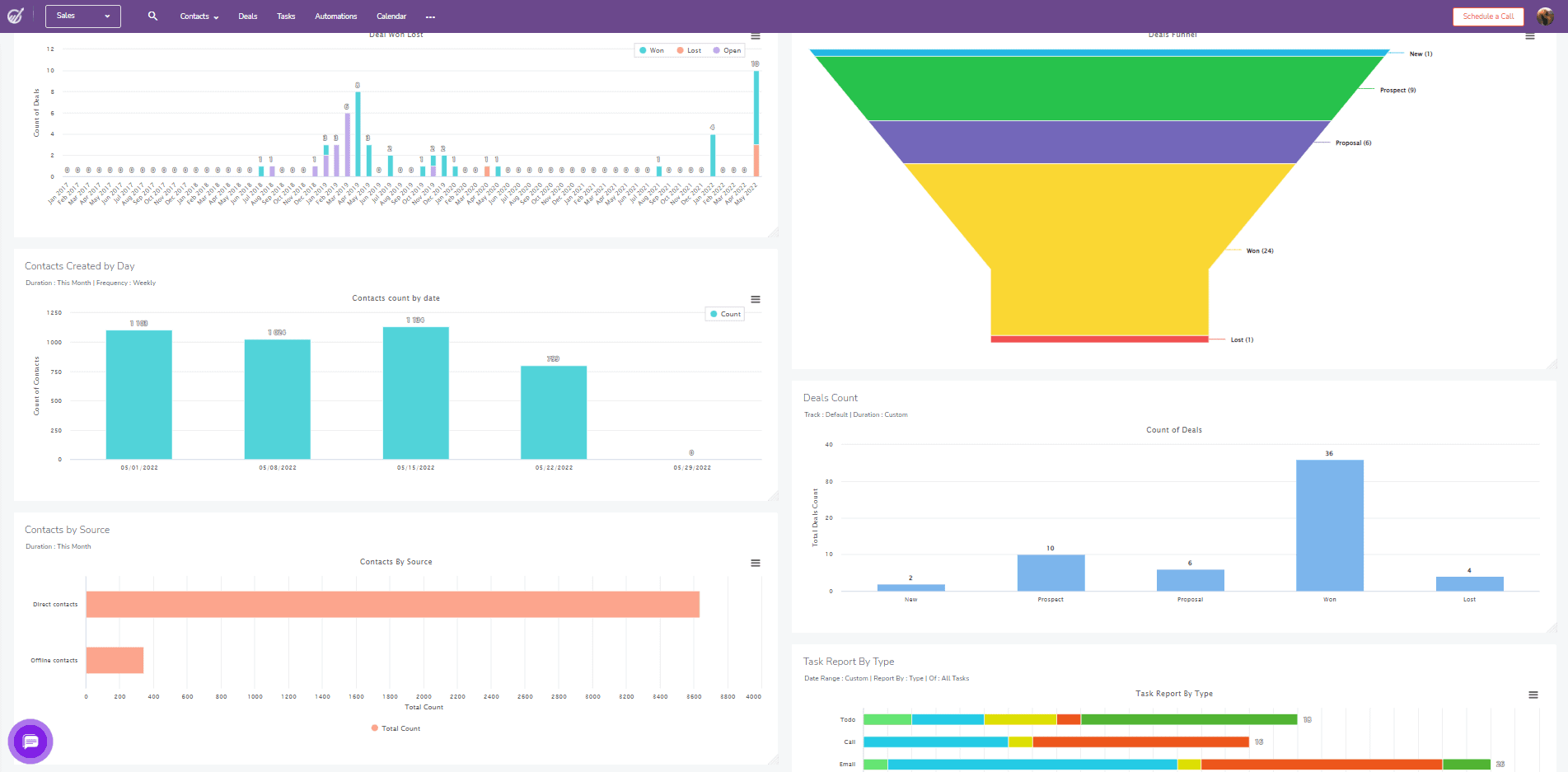
You can’t determine the effectiveness of your marketing automations without a way to measure the results, right?
This is where KPIs (Key Performance Indicators) come into play. You need to constantly monitor these KPIs to optimize your marketing strategy:
- Cost per qualified lead: This is the amount you have invested in generating a qualified lead for your business.
- Traffic sources: This KPI is a breakdown of where your traffic is coming from. Do you get more leads through organic traffic, paid ad traffic, or social media ads?
- Cost per site visit: A site visit is one of the important steps in the real estate buyer’s journey. This KPI calculates which marketing strategies ended up with more conversions after a site visit.
- Referral percentage: A lot of leads in real estate are generated through referrals from family and friends. You can calculate your referral percentage to determine whether you need to boost the number of referrals you’re getting.
- Landing page conversion rates: How many people converted to paying customers or prospects after visiting your landing pages? What strategies worked to boost conversions?
Setting up your marketing automation process becomes much easier when you have the right marketing tools for your firm. Let’s dive into some of the best marketing automation tools for real estate in 2023.
Read also: 15 Easy Steps to Win at Real Estate Email Marketing
Top Tools for Automating Your Real Estate Marketing Process
Finding the right tool for your marketing needs is half your battle won already. Here are our top recommendations for real estate marketing automation tools for 2023.
1. HubSpot
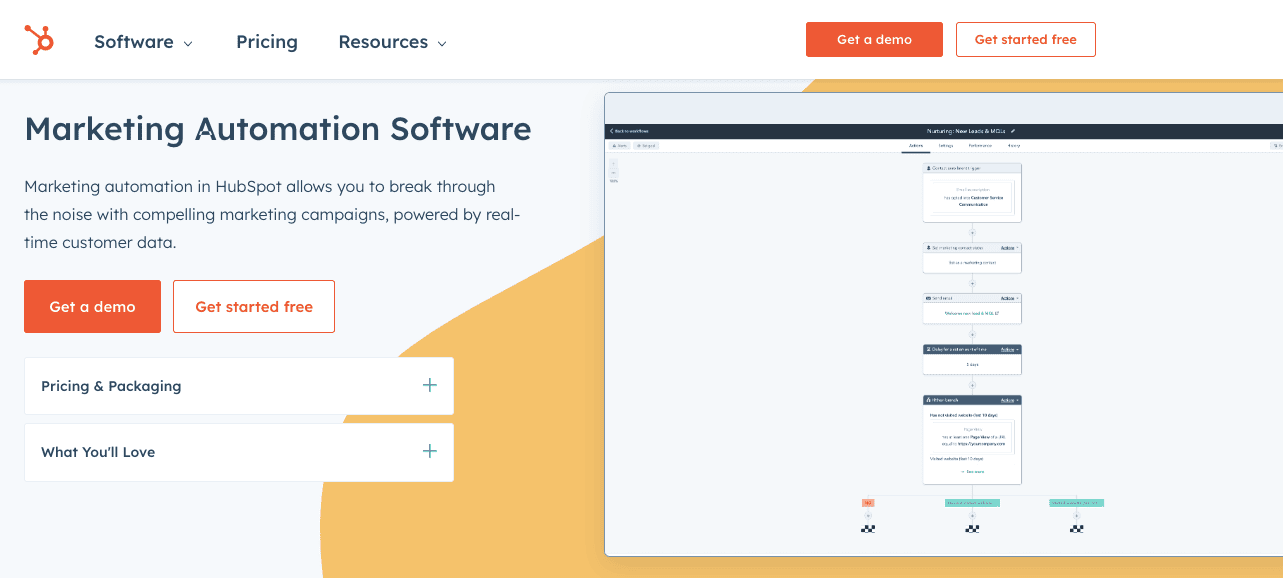
HubSpot is one of the top marketing and CRM solutions for medium and large enterprises. Here are some of the best features of the HubSpot marketing hub:
- Excellent intelligent automation workflows: HubSpot has some of the best automation features that can make your life easier. It allows you to easily create and customize workflows for contact list building, property listings, and landing pages.
- Marketing reports and analytics: HubSpot offers some of the easiest and most intuitive dashboards, where you can view all your reports and analytics in one place.
- Social media monitoring and third-party integrations: HubSpot also provides great features to monitor your performance on social media. It also offers integrations with many third-party apps like Zillow to make your life easier.
2. EngageBay
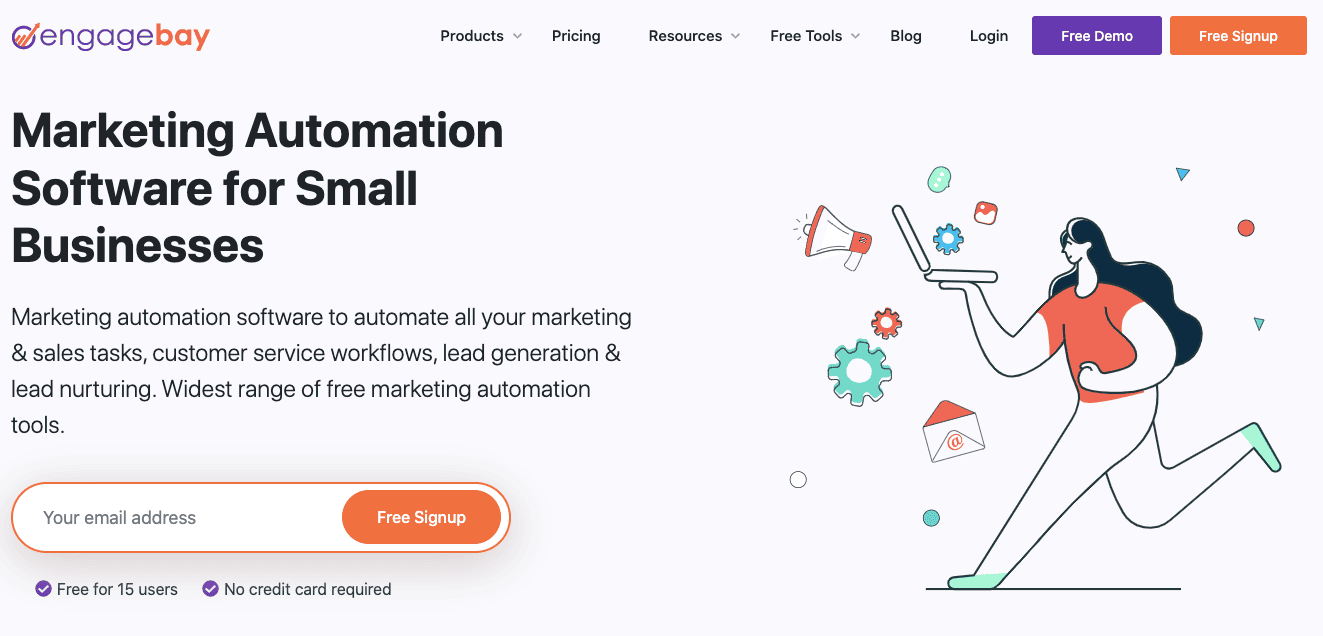
EngageBay has steadily emerged as one of the leading cloud-based CRM solutions available today. And, what’s more, it is cost-effective for businesses of all sizes. Here are some of the best features of EngageBay’s all-in-one platform for real estate:
- Intuitive and efficient user interface: EngageBay’s user interface is very intuitive. This means that there is less of a learning curve, and your staff can master the use of this software quickly.
- Cost-effective and feature-packed: EngageBay offers most, if not all, of the features any realtor would look for in their CRM solution. And, it won’t burn a hole through your pocket while offering the same features as other apps.
- Excellent workflow automations: EngageBay offers a powerful marketing automation system. This means that creating custom workflows and editing them has never been easier.
- Free Email Templates: Access a library of professionally designed, customizable email templates to streamline your marketing efforts and enhance engagement.
3. Manychat
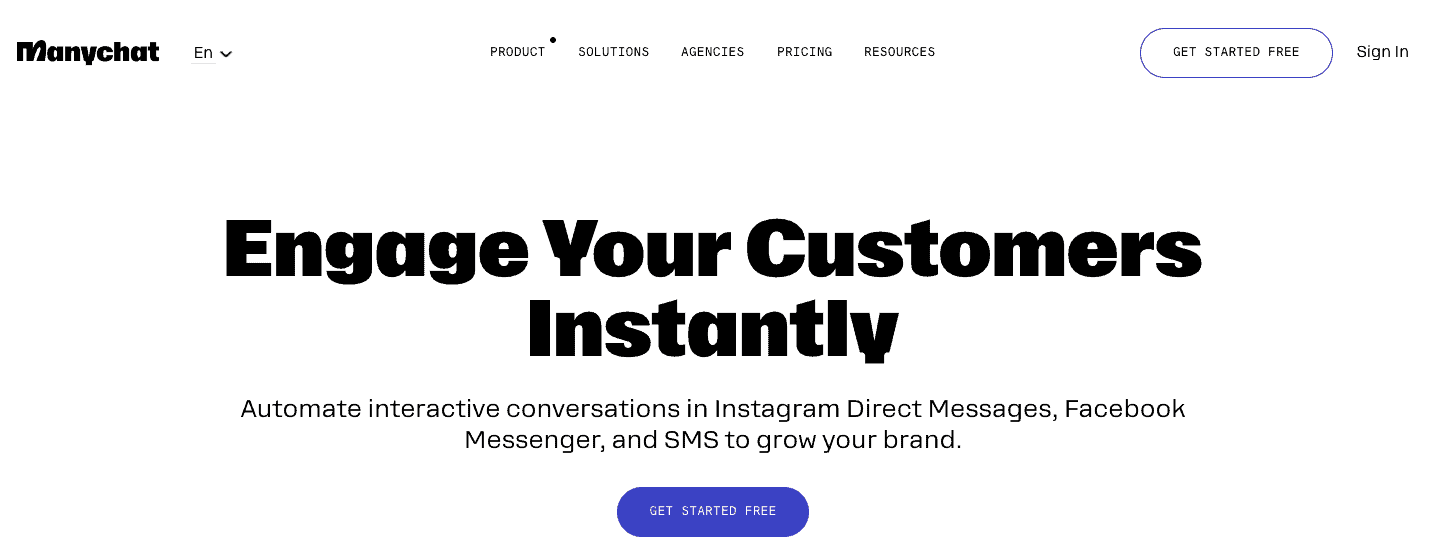
Manychat is yet another great marketing automation solution for realtors and brokerages. Some of the features we think are great are:
- Omnichannel integrations: With Manychat, you can see your Instagram, Facebook, WhatsApp, email, and SMS channels all in one dashboard.
- Templates for automations: Manychat offers several effective pre-built templates for workflows. You can use them or customize them further, based on your needs.
- Integrated SMS and email campaign options: You can easily make use of multiple channels like email and SMS to get the most out of each channel at the right time.
4. Dotloop
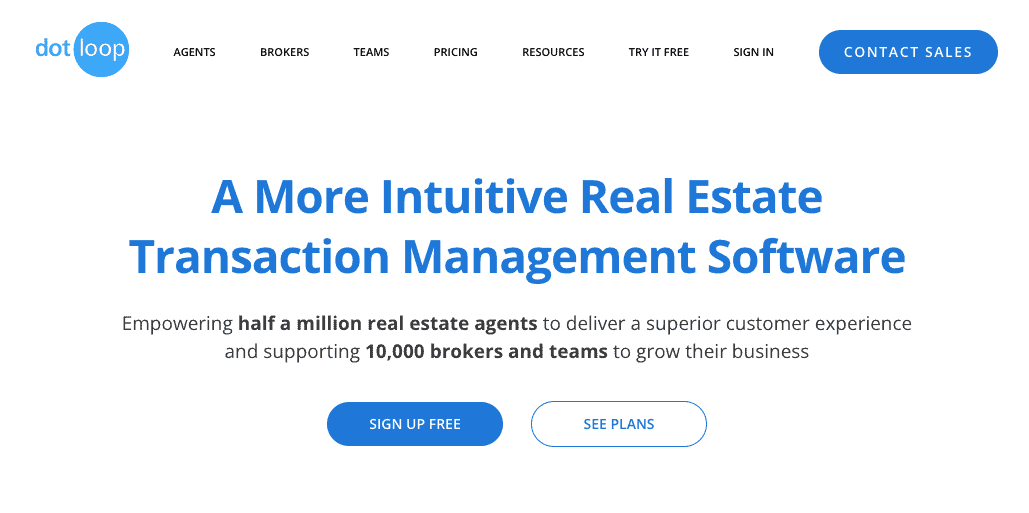
Dotloop is a cloud-based real estate transaction management software that caters to agents, brokerages, and customer service professionals alike. Here are the stand-out features that make Dotloop worth your consideration:
- Manage transaction documents and e-sign them: Dotloop allows agents to manage all their real estate transactions from beginning to end. The e-signing feature allows you to expedite the process.
- Workflow tools: It offers great features to create and edit workflows for realtors and brokerages.
- Document Templates: With this feature, you can upload a document that you regularly use. Then, you can save them as templates to make future use faster. This is especially helpful if you have a large number of documents that regularly need to be filled in and signed.
5. Wise Agent
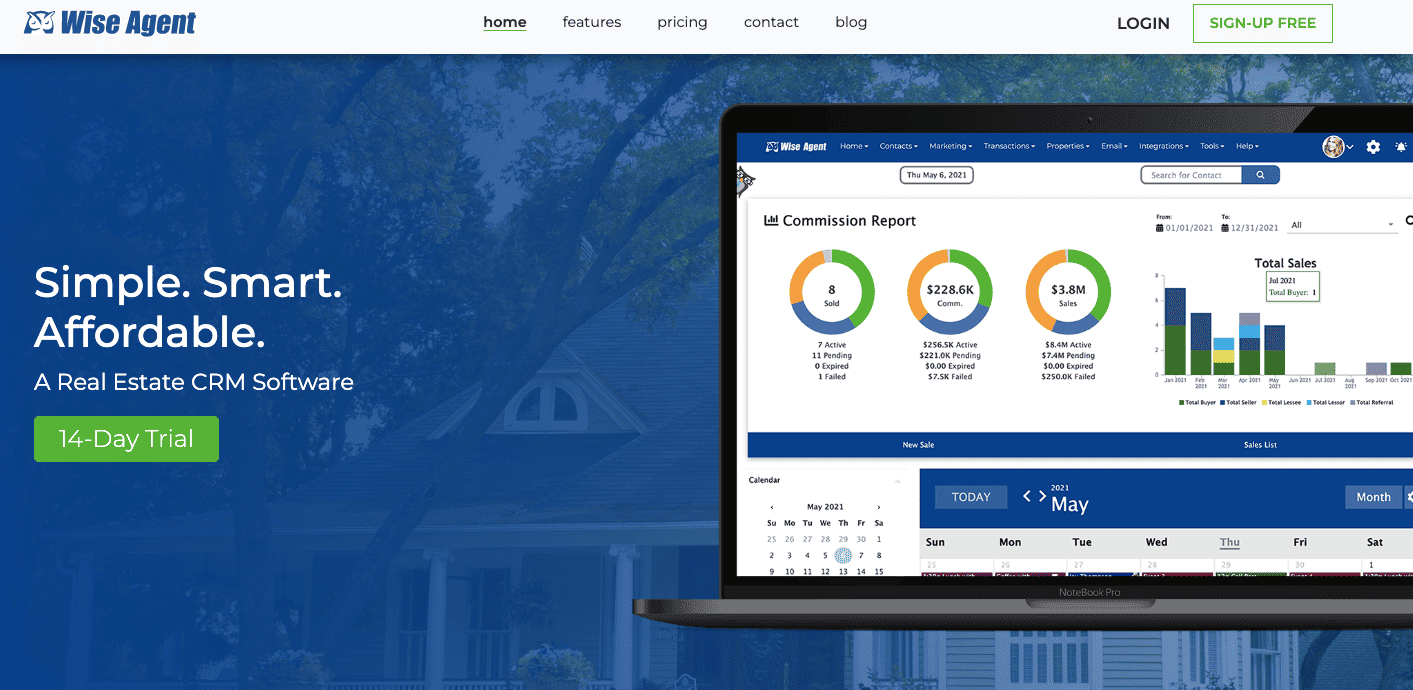
Wise Agent is a cloud-based CRM solution targeted at agents, brokerages, and real estate investors. Some of the best features of Wise Agent include:
- Lead Management Solutions: Lead management is made simpler with Wise Agent. These tools make it easy for you to categorize and manage new leads.
- Scheduling feature: There’s a daily planner included in the dashboard. This allows agents to stay on top of their daily tasks and appointments. Especially if each agent is dealing with a large number of clients every week, this feature is a great add-on.
Price Comparison for real estate marketing automation tools
| HubSpot Marketing Hub | EngageBay all-in-one Platform | Manychat | Dotloop | Wise Agent | |
| No. of Pricing Plans available | 4 (including free plan) | 4 (including free plan) | 2 (including free plan) | 3 (no free plan) | 3 (no free plan) |
| Starter Plan | $50/month | $12.74/user/month | Free | $ 31.99/month | $ 32/month |
| Mid-Tier Plan | $890/month | $42.49/user/month | N/A | Custom Pricing | $ 326/year |
| Premium Plan | $3,200/month | $84.99/user/month | $45/month for 5,000 contacts | Custom Pricing | Custom Pricing |
| Free Trial | 14-day Free Trial | Lifetime Free Plan, no Trial | 7-day Free Trial | 10 Free Transactions | 14-day Free Trial |
Now that you have an idea of the kind of marketing tools you’d need, let’s take a look at some use cases for real estate marketing automation.
Read also: 14 Real Estate Lead Generation Tips for Quick Results
Real Estate Marketing Automation Use Cases
Here are some of the most important use cases for real estate marketing automation for you to consider. These examples are just the tip of the iceberg. You can accomplish much more with the right real estate marketing campaign.
Automated real estate email newsletters or curated posts
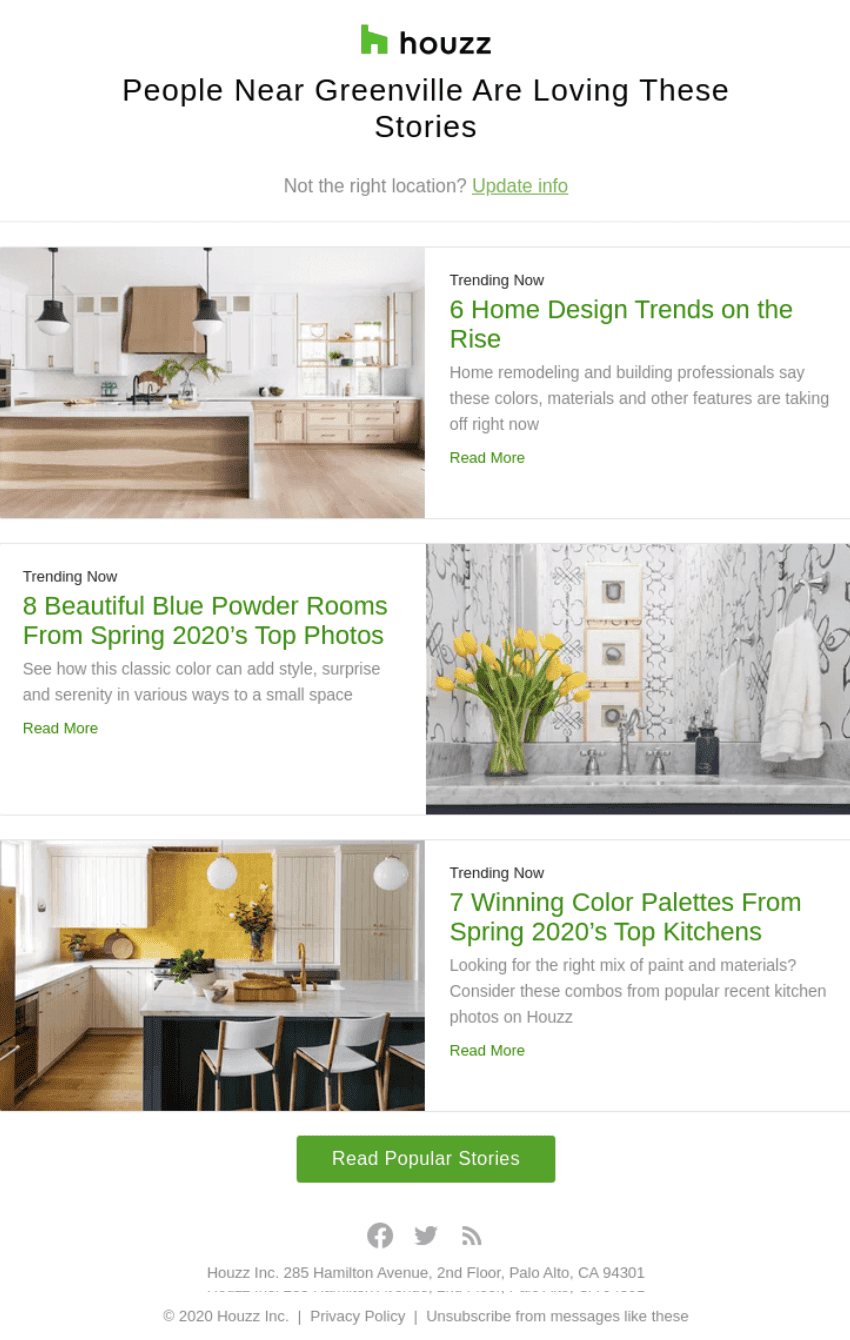
Real estate newsletters are a great way to nurture your leads and remain fresh in the minds of your past clients as well. You can create automations to make sending a biweekly or monthly newsletter a piece of cake.
Another great option is to send regular emails with curated posts. This will allow you to keep your clients engaged and promote your best content. In the long run, all these campaigns establish you as an expert in the minds of your customers.
With marketing automation, you can schedule your newsletter for a particular time based on your requirements. You can also curate blog posts with the best performance and send them via email to boost their performance further.
You can simply create an email template with your branding and colors. The text can be auto-populated with marketing automation.
Drip campaign automation for real estate
A drip campaign is a series of emails sent at pre-set intervals to nurture a lead, based on their stage in the customer journey or sales funnel.
Let’s look at this with an example. Let’s say you have just got a new lead through a sign-up form on your website. You can use email automations to run this drip campaign over the next three months:
- Welcome email: This is an automated email that welcomes the new lead to your company. This can be sent as soon as the prospect signs up.
- Single or multiple listing emails after three days: Based on the prospect’s past behavior and requirements, you can send promotional emails featuring one or more properties that would be a great match for this prospect. This can be sent after three days.
- Open house emails: If you have an open house that this prospect would be interested in, you can send them an email inviting them to the open house.
- Real Estate Newsletter: You can email the prospect your monthly newsletter after a couple of weeks.
- Personalized emails based on trigger actions: Let’s say your prospect browsed new listings on your website and saved two of them. You can schedule an automated reminder to take action on the saved listing. You can also send them links to similar properties in the area they are interested in.
This is just one example of a drip campaign for one new lead. You can use automated drip campaigns for many different scenarios.
Read more: 15 Easy Steps to Start Real Estate Email Marketing Like a Pro
Wrap Up
We hope that this guide article helped you in your real estate marketing automation journey. Take the best of what you see here and test, test, test.
Also, remember that testing your marketing automation strategies shouldn’t cost you an arm and a leg. EngageBay is the world’s most affordable all-in-one marketing automation and CRM solution, loved by thousands already.
Try it for free today!
👉 Have you tried our email templates? Share your experience in the comments below, and let us know how they worked for your campaigns!
